Mississippi Today
Gov. Tate Reeves cost taxpayers at least $31,000 in questionable state airplane trips

Gov. Tate Reeves, in his first term as governor, used at least $31,000 in taxpayer funds to take trips on Mississippi’s state airplane to political events that don’t appear to directly involve state business, according to a review of flight records and the governor’s social media posts.
The trips in question range from taking the plane to attend partisan gatherings hosted by groups that have donated more than $1 million to Reeves’ campaigns to overlapping state business with campaign fundraising efforts.
The state’s Office of Air Transport Services allows the governor, other statewide officials and agency leaders to use the airplane for official state business. The purpose of the state aircraft is for a state employee to conduct business on behalf of Mississippi or to benefit the state, according to a policy listed on the Department of Finance and Administration’s website.
While that loosely worded policy does not define official business or include examples of what type of travel is prohibited, the use of the state plane has long been scrutinized by elected officials and the press.
Before he was elected governor, Reeves was among those who raised questions about expensive taxpayer-funded trips. In a 2013 hearing, when Reeves was lieutenant governor and chairman of the Joint Legislative Budget Committee, he highlighted questionable state plane trips to publicly question a policy at the time that gave state agency heads more flexibility in how tax dollars were spent.
“What we are now trying to determine is, has that flexibility been good for the taxpayers or has it been not so good for the taxpayers?” Reeves said at the time.
Since he was elected governor, however, Reeves used the plane for trips that could fall under similar scrutiny. As governor, not only does he have first dibs for plane usage, but he also leads the agency, DFA, that manages the use of the state aircraft.
Mississippi Today analyzed thousands of pages of flight records, obtained through a public records request, that span from January 2020, when Reeves took office as governor, through June 2023.
Several trips, most of which have not previously been reported, raise questions about how the governor has used the taxpayer-owned plane, the rules surrounding the usage of the plane, and whether the governor used the aircraft for political purposes.
Communications officials at DFA did not respond to specific questions from Mississippi Today on whether the agency has an independent process to review if the governor is using the aircraft for official business.
Corey Custer, deputy chief of staff to Reeves, defended the trips in a Wednesday statement to Mississippi Today, saying they were “absolutely appropriate uses of the governor’s time and resources.”
“These (trips) are important to advancing the interests of our state and implementing a conservative agenda that has helped make Mississippi stronger than ever before,” Custer said. “Mississippians want somebody who will fight to defend their way of life and advance principled policy ideas, and that’s what Governor Reeves will continue to do.”
Reeves flies to CPAC
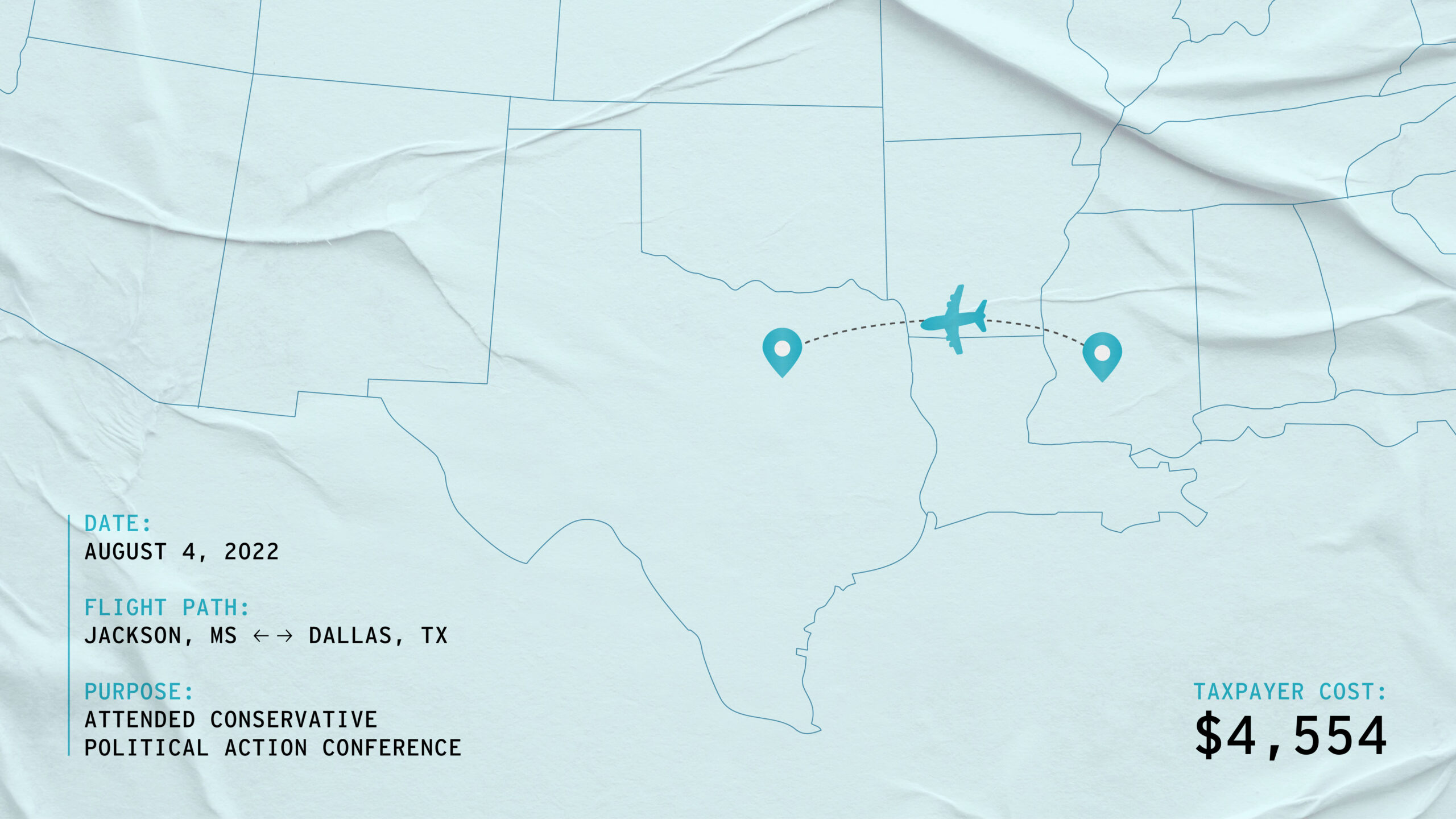
In August 2022, Reeves used the state plane to travel to the Conservative Political Action Conference, an openly partisan organization that lobbies for conservative causes.
Pilots flew the plane without any passengers from Jackson to Hattiesburg on Aug. 4, 2022, where they picked up Reeves, one of his daughters and Custer, the governor’s communications staffer. The three ate catered food aboard the aircraft and traveled from Hattiesburg to Dallas for the CPAC conference. They stayed in Dallas overnight and returned to Jackson the next day at a cost of $4,554 in taxpayer funds.
At the conference, the governor blistered Democrats, who had control of both chambers of Congress and the White House, for how they handled the nation’s economy.
“Inflation is at a 40-year high, and everybody’s paying more,” Reeves said at the event.
But before Reeves decried liberals making average citizens pay more for goods and services, he had used taxpayer dollars to attend at least three partisan events within the previous few months.
Flights to Republican Governors Association events
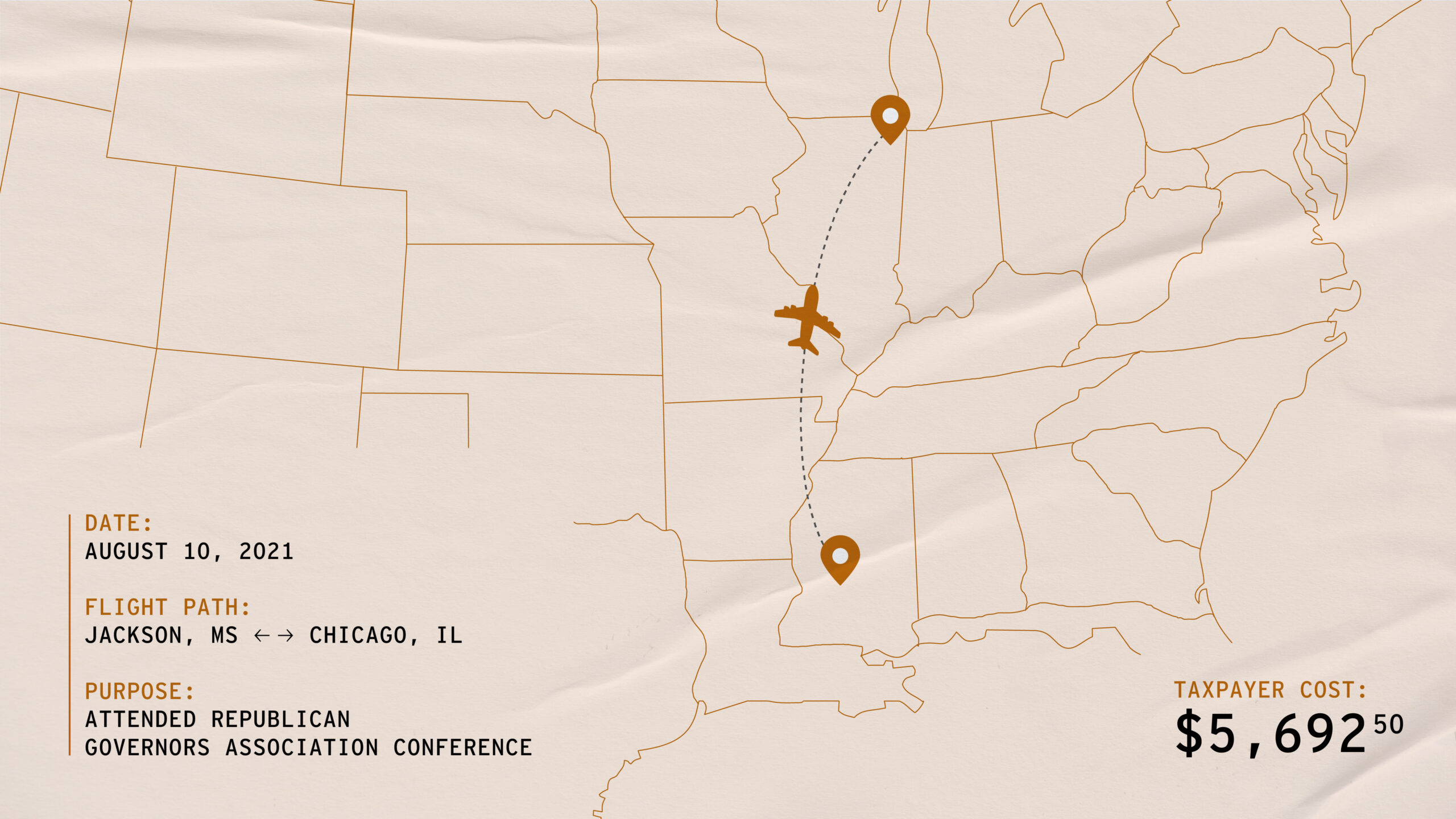
The governor appears to have used the plane three separate times on May 25, 2021; Aug. 10, 2021; and May 23, 2022; to attend Republican Governors Association events around the country, costing taxpayers a total of $13,245.
His August 2021 trip occurred when hospitals around the state were struggling with an influx of COVID-19 cases. Lee McCall, a Neshoba County hospital administrator, publicly pleaded for the governor’s help to deal with the surge in cases.
“Hospitals and healthcare workers need you to help us,” McCall wrote about Reeves. “Where are you?”
Reeves’ office told the Clarion Ledger at the time that he flew to Chicago on a commercial flight, and prior to the conference, he was out of the state for a personal trip with his family.
While he may have used a commercial flight to travel to Chicago, the location of the RGA conference, taxpayers still paid $5,692 for the aircraft to travel from Jackson to Chicago to pick up Reeves and his family from the conference before returning them back to the state.
Unlike the bipartisan National Governors Association where policy is often discussed, the main description leading the homepage of the RGA’s website says, “The RGA helps elect Republican governorships throughout the nation.”
The RGA has also been one of Reeves’ biggest contributors. The organization dumped over $1.8 million into his 2019 campaign for governor, and it is widely expected to write more large checks to his campaign during the current election cycle.
Reeves did not promote the May 2021 and May 2022 RGA conferences on any of his social media accounts, and there do not appear to be any records available to independently confirm if the RGA events were the sole reason for the governor’s trip.
However, the RGA notes in a press release on its website that several governors were speaking to a radio host on May 27, 2021, as part of its “spring policy conference” in Nashville, the same time that Reeves was also there.
South Carolina Gov. Henry McMaster also noted on his 2022 public schedule he was attending an RGA conference on May 24 through May 26, confirming that there was an RGA conference when Reeves used the state plane to travel there.
Reeves flies to national anti-abortion group events
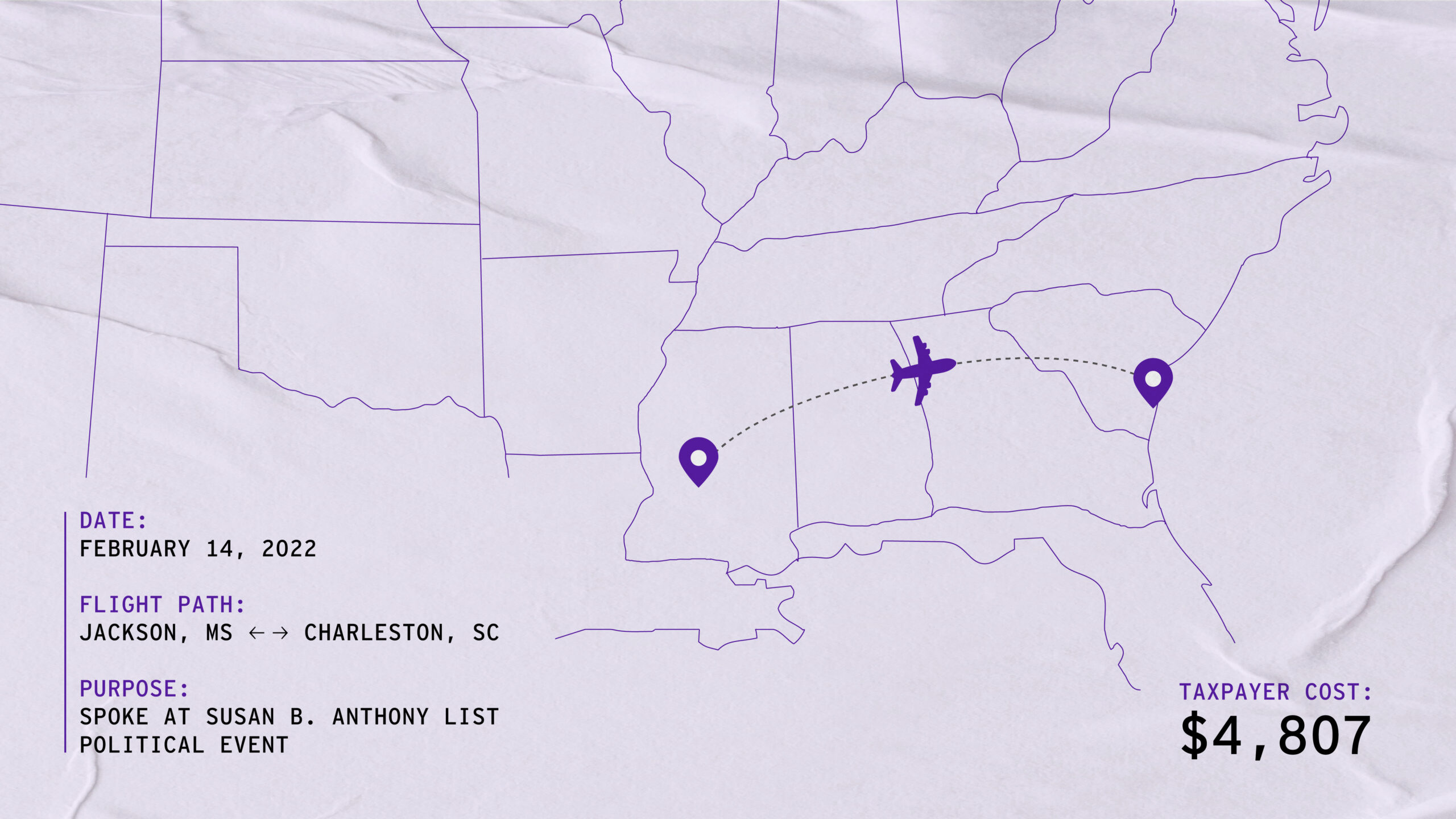
Reeves used the airplane on the public’s dime on Feb. 14, 2022, and Oct. 4, 2022, to attend events for the Susan B. Anthony List, a nonprofit organization that combines “politics with policy” by working to advance pro-life laws through “direct lobbying and grassroots campaigns.”
Custer accompanied the governor on the Valentine’s Day trip to Charleston, South Carolina, which cost taxpayers $4,807. The plane records list a “speaking engagement” as the reason for the flight.
The governor promoted his appearance at the February event on social media, saying it was great “meeting and praying with so many of our allies at the Susan B. Anthony List Pro-Life Leaders Summit.”
“Together, we’re going to save millions of babies and ensure expecting mothers receive the quality care that they deserve,” Reeves wrote.
The governor’s campaign that same weekend also recorded spending $305 of his own donations on “travel expenses” to pay for a hotel room at Kiawah Island Golf Resort, the location of the SBA conference. But the hotel later refunded the room to the campaign, according to his campaign’s filings with the Secretary of State’s office.
It’s unclear why his campaign, at least initially, paid for a hotel room at the conference or why the hotel refunded the payment. Reeves’ office did not address questions seeking to clarify the use of campaign funds.
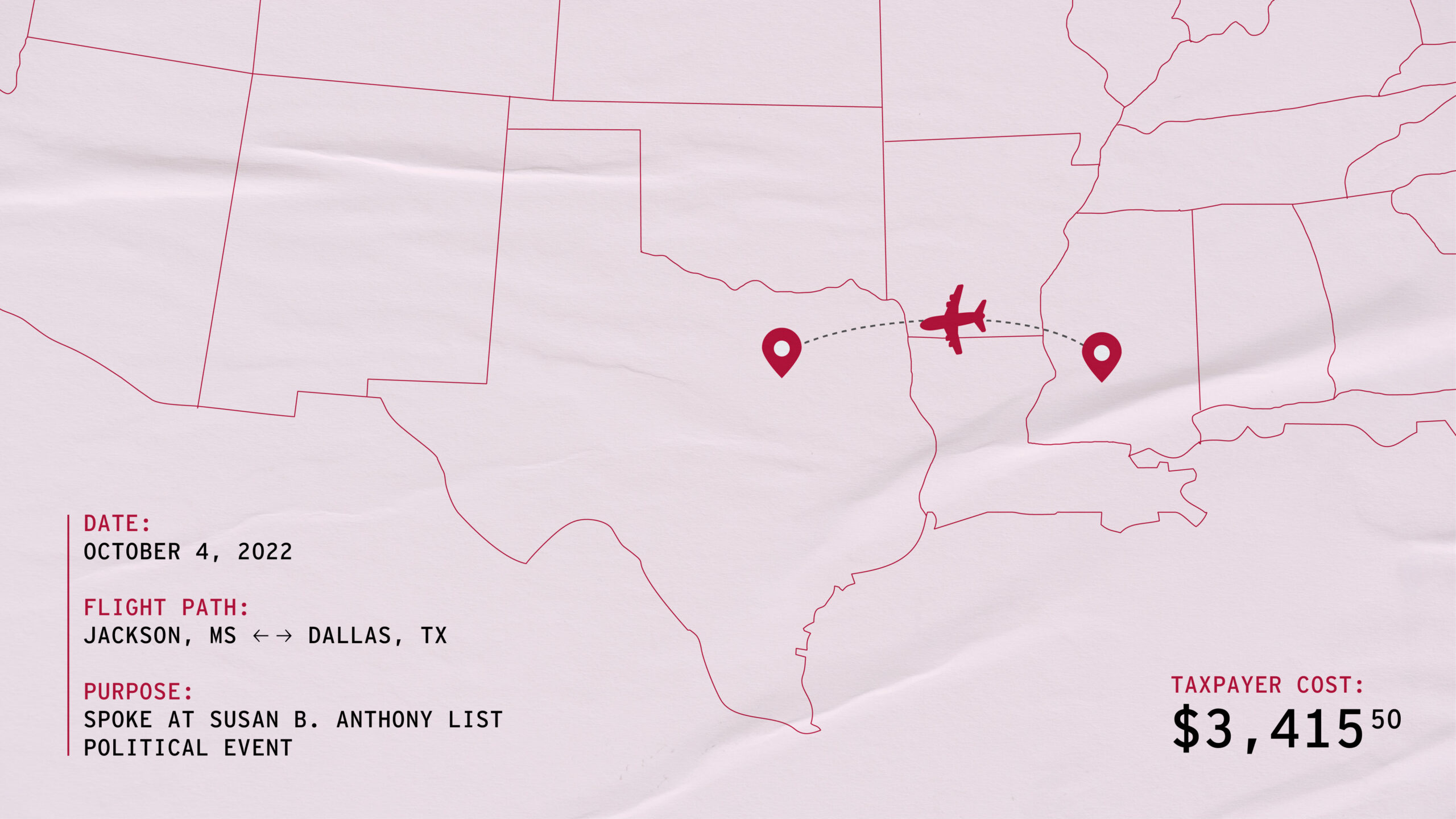
The governor also used the plane on Oct. 4, 2022, to travel to another SBA List event in Dallas for a “speaking engagement,” which cost taxpayers $3,415. The governor, again, touted the trip on social media.
SBA’s PAC donated $2,500 to the governor’s campaign on Oct. 13, 2022, and the organization has endorsed his bid for reelection. The Mississippi Republican Party has publicly touted that endorsement.
Reeves flies to Florida for Fox News town hall
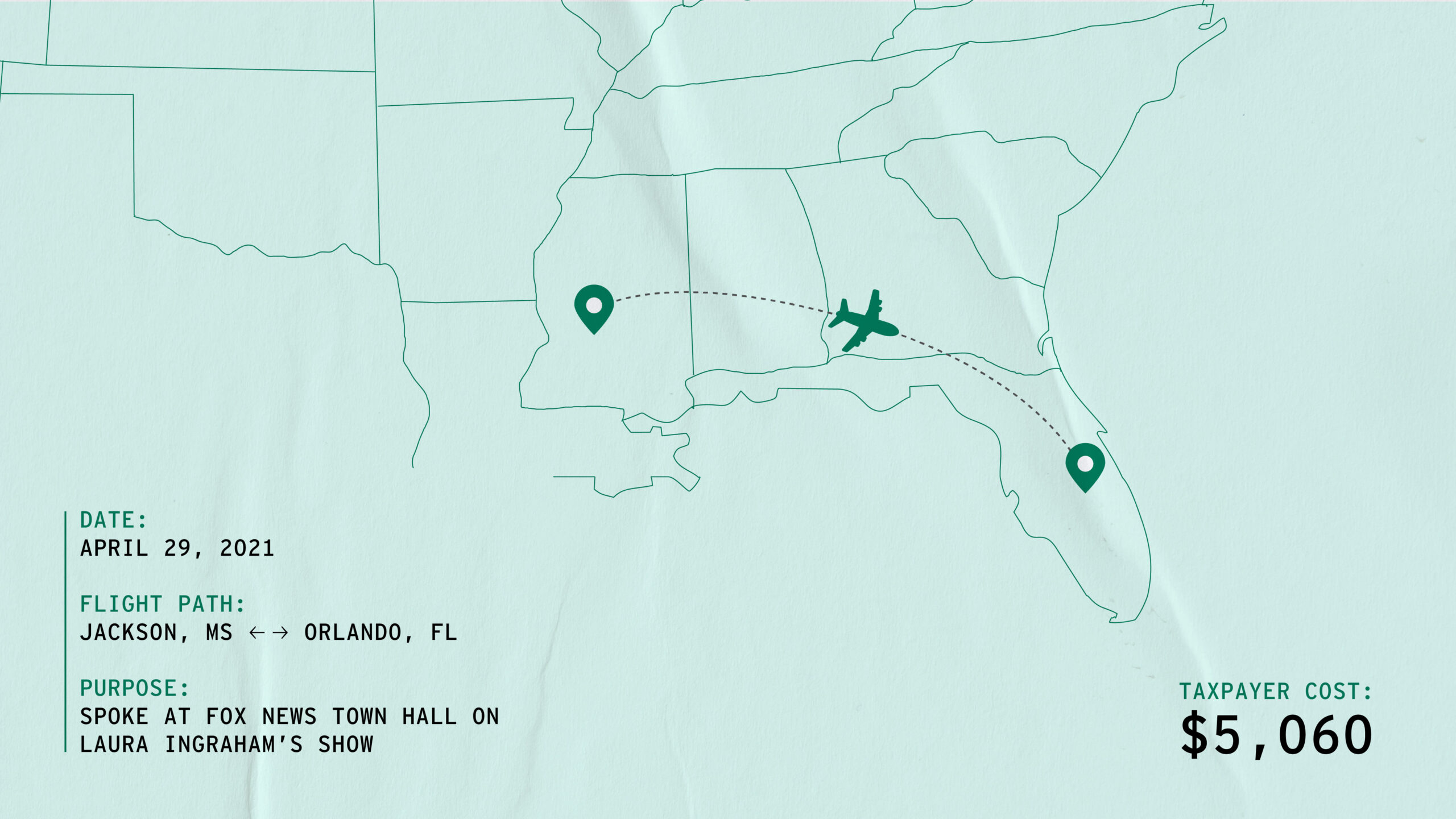
On April 29, 2021, Reeves chartered the state plane to travel to Orlando, Florida, where he participated in a “Red State Trailblazers Town Hall” with Fox News host Laura Ingraham.
A Reeves aide accompanied the governor on the Orlando trip for a cost of $5,060, where catered food was also provided to the two.
Reeves joined Texas Gov. Greg Abbott, Florida Gov. Ron DeSantis, Iowa Gov. Kim Reynolds and Nebraska Gov. Pete Ricketts for the town hall with Ingraham to discuss the COVID-19 pandemic and other political issues.
During one portion of the interview, Ingraham played a clip of President Joe Biden’s 2021 State of the Union speech, where he called on Congress to address systemic racism in the country. The Fox News host asked Reeves to respond.
Reeves said he did not believe systemic racism exists in America. As evidence, he touted that while the nation was dealing with a wave of protests over police brutality after the murder of George Floyd, Mississippi experienced no violent protests. He attributed this to Mississippians’ pro-law enforcement sentiments.
“We’re not trying to defund the police like the far left, we’re actually investing in our police because we know we’re indebted to them for keeping our communities safe,” Reeves said.
It’s common for public officials, including the governor, to give interviews to news outlets. But during his governorship, Reeves has commonly granted interviews to national news outlets like NBC, CNN, CBS and ABC via Zoom.
In-state plane trips paired with campaign fundraisers
The first-term governor also appears to have used the state plane at least 10 times to mix fundraising events with official state business, according to a review of social media posts, plane records and campaign finance reports.
While not explicitly prohibited in DFA policy, the governor’s travel habits reveal how closely his official duties have been linked with political fundraising.
For example, Reeves’ office on Oct. 5, 2022, requested to use the plane on Oct. 12-13 of that year for a “speaking engagement” on the Coast.
The governor, accompanied by a staffer, departed Jackson at 1:45 p.m. on Oct. 12 and arrived in Kiln at 2:35 p.m. The governor on Facebook wrote that he participated in a ribbon cutting for the RESTORE Dock in Hancock County.
While the ribbon cutting was official state business, his campaign account that day reported raking in around 24 donations from people who live in Gulf Coast towns, totaling $21,000 in contributions that day alone.
Reeves and the staffer departed Kiln and returned to Jackson the next morning on Oct. 13. The total trip cost taxpayers $1,391.
Another instance where the governor might have overlapped fundraising events with official state business happened on May 16, 2022, when pilots traveled to Olive Branch in DeSoto County to bring Reeves back to Jackson.
The governor wrote on Facebook that he was touring the Ardagh Metal Packaging plant in Olive Branch, but his campaign finance reports show that around 34 people in north Mississippi donated around $37,500 to his campaign that same day.
Flight records show Reeves’ office on May 2 requested to use the flight to travel to north Mississippi for “speaking engagements.” The plane left Jackson without any passengers at 5 p.m. and returned to Jackson with the governor and an aide at 7:30 p.m., at a cost of $1,771.
Mississippi Today found at least eight other instances where the governor might have used the plane to travel to places for state business, and fresh campaign donations were recorded near those same places on those same dates.
This article first appeared on Mississippi Today and is republished here under a Creative Commons license.
Mississippi Today
Mississippi prepares for another execution
The Mississippi Supreme Court has set the execution of a man who kidnapped and murdered a 20-year-old community college student in north Mississippi 30 years ago.
Charles Ray Crawford, 59, is set to be executed Oct. 15 at the Mississippi State Penitentiary at Parchman, after multiple requests by the attorney general’s office.
Eight justices joined the majority opinion to set the execution, concluding that Crawford has exhausted all state and federal legal remedies. Mississippi Supreme Court Justice T. Kenneth Griffis Jr. wrote the Friday opinion. Justice David Sullivan did not participate.
However, Kristy Noble with the Mississippi Office of Capital Post-Conviction Counsel released a statement saying it will file another appeal with the U.S. Supreme Court.
“”Mr. Crawford’s inexperienced trial counsel conceded his guilt to the jury — against Mr.
Crawford’s timely and repeated objections,” Noble said in the statement. “Mr. Crawford told his counsel to pursue a not guilty verdict. Counsel did just the opposite, which is precisely what the U.S. Supreme Court says counsel cannot do,” Noble said in the statement.
“A trial like Mr. Crawford’s – one where counsel concedes guilt over his client’s express wishes – is essentially no trial at all.”
Last fall, Crawford’s attorneys asked the court not to set an execution date because he hadn’t exhausted appeal efforts in federal court to challenge a rape conviction that is not tied to his death sentence. In June, the U.S. Supreme Court declined to take up Crawford’s case.
A similar delay occurred a decade ago, when the AG’s office asked the court to reset Crawford’s execution date, but that was denied because efforts to appeal his unrelated rape conviction were still pending.
After each unsuccessful filing, the attorney general’s office asked the Mississippi Supreme Court to set Crawford’s execution date.
On Friday, the court also denied Crawford’s third petition for post-conviction relief and a request for oral argument. It accepted the state’s motion to dismiss the petition. Seven justices concurred and Justice Leslie King concurred in result only. Again, Justice Sullivan did not participate.
Crawford was convicted and sentenced to death in Lafayette County for the 1993 rape and murder of North Mississippi Community College student Kristy Ray.
Days before he was set to go to trial on separate aggravated assault and rape charges, he kidnapped Ray from her parents’ Tippah County home, leaving ransom notes. Crawford took Ray to an abandoned barn where he stabbed her, and his DNA was found on her, indicating he sexually assaulted her, according to court records.
Crawford told police he had blackouts and only remembered parts of the crime, but not killing Ray. Later he admitted “he must of killed her” and led police to Ray’s body, according to court records.
At his 1994 trial he presented an insanity defense, including that he suffered from psychogenic amnesia – periods of time lapse without memory. Medical experts who provided rebuttal testimony said Crawford didn’t have psychogenic amnesia and didn’t show evidence of bipolar illness.
The last person executed in Mississippi was Richard Jordan in June, previously the state’s oldest and longest serving person on death row.
There are 36 people on death row, according to records from the Mississippi Department of Corrections.
Update 9/15/25: This story has been updated to include a response from the Mississippi Office of Capital Post-Conviction Counsel
This article first appeared on Mississippi Today and is republished here under a Creative Commons Attribution-NoDerivatives 4.0 International License.
The post Mississippi prepares for another execution appeared first on mississippitoday.org
Note: The following A.I. based commentary is not part of the original article, reproduced above, but is offered in the hopes that it will promote greater media literacy and critical thinking, by making any potential bias more visible to the reader –Staff Editor.
Political Bias Rating: Centrist
The article presents a factual and balanced account of the legal proceedings surrounding a scheduled execution in Mississippi. It includes perspectives from both the state’s attorney general’s office and the defense counsel, without using emotionally charged language or advocating for a particular political stance. The focus on legal details and court decisions reflects a neutral, informative approach typical of centrist reporting.
Mississippi Today
Presidents are taking longer to declare major natural disasters. For some, the wait is agonizing
TYLERTOWN — As an ominous storm approached Buddy Anthony’s one-story brick home, he took shelter in his new Ford F-250 pickup parked under a nearby carport.
Seconds later, a tornado tore apart Anthony’s home and damaged the truck while lifting it partly in the air. Anthony emerged unhurt. But he had to replace his vehicle with a used truck that became his home while waiting for President Donald Trump to issue a major disaster declaration so that federal money would be freed for individuals reeling from loss. That took weeks.
“You wake up in the truck and look out the windshield and see nothing. That’s hard. That’s hard to swallow,” Anthony said.
Disaster survivors are having to wait longer to get aid from the federal government, according to a new Associated Press analysis of decades of data. On average, it took less than two weeks for a governor’s request for a presidential disaster declaration to be granted in the 1990s and early 2000s. That rose to about three weeks during the past decade under presidents from both major parties. It’s taking more than a month, on average, during Trump’s current term, the AP found.
The delays mean individuals must wait to receive federal aid for daily living expenses, temporary lodging and home repairs. Delays in disaster declarations also can hamper recovery efforts by local officials uncertain whether they will receive federal reimbursement for cleaning up debris and rebuilding infrastructure. The AP collaborated with Mississippi Today and Mississippi Free Press on the effects of these delays for this report.
“The message that I get in the delay, particularly for the individual assistance, is that the federal government has turned its back on its own people,” said Bob Griffin, dean of the College of Emergency Preparedness, Homeland Security and Cybersecurity at the University at Albany in New York. “It’s a fundamental shift in the position of this country.”
The wait for disaster aid has grown as Trump remakes government
The Federal Emergency Management Agency often consults immediately with communities to coordinate their initial disaster response. But direct payments to individuals, nonprofits and local governments must wait for a major disaster declaration from the president, who first must receive a request from a state, territory or tribe. Major disaster declarations are intended only for the most damaging events that are beyond the resources of states and local governments.
Trump has approved more than two dozen major disaster declarations since taking office in January, with an average wait of almost 34 days after a request. That ranged from a one-day turnaround after July’s deadly flash flooding in Texas to a 67-day wait after a request for aid because of a Michigan ice storm. The average wait is up from a 24-day delay during his first term and is nearly four times as long as the average for former Republican President George H.W. Bush, whose term from 1989-1993 coincided with the implementation of a new federal law setting parameters for disaster determinations.
The delays have grown over time, regardless of the party in power. Former Democratic President Joe Biden, in his last year in office, averaged 26 days to declare major disasters — longer than any year under former Democratic President Barack Obama.

FEMA did not respond to the AP’s questions about what factors are contributing to the trend.
Others familiar with FEMA noted that its process for assessing and documenting natural disasters has become more complex over time. Disasters have also become more frequent and intense because of climate change, which is mostly caused by the burning of fuels such as gas, coal and oil.
The wait for disaster declarations has spiked as Trump’s administration undertakes an ambitious makeover of the federal government that has shed thousands of workers and reexamined the role of FEMA. A recently published letter from current and former FEMA employees warned the cuts could become debilitating if faced with a large-enough disaster. The letter also lamented that the Trump administration has stopped maintaining or removed long-term planning tools focused on extreme weather and disasters.
Shortly after taking office, Trump floated the idea of “getting rid” of FEMA, asserting: “It’s very bureaucratic, and it’s very slow.”
FEMA’s acting chief suggested more recently that states should shoulder more responsibility for disaster recovery, though FEMA thus far has continued to cover three-fourths of the costs of public assistance to local governments, as required under federal law. FEMA pays the full cost of its individual assistance.
Former FEMA Administrator Pete Gaynor, who served during Trump’s first term, said the delay in issuing major disaster declarations likely is related to a renewed focus on making sure the federal government isn’t paying for things state and local governments could handle.
“I think they’re probably giving those requests more scrutiny,” Gaynor said. “And I think it’s probably the right thing to do, because I think the (disaster) declaration process has become the ‘easy button’ for states.”
The Associated Press on Monday received a statement from White House spokeswoman Abigail Jackson in response to a question about why it is taking longer to issue major natural disaster declarations:
“President Trump provides a more thorough review of disaster declaration requests than any Administration has before him. Gone are the days of rubber stamping FEMA recommendations – that’s not a bug, that’s a feature. Under prior Administrations, FEMA’s outsized role created a bloated bureaucracy that disincentivized state investment in their own resilience. President Trump is committed to right-sizing the Federal government while empowering state and local governments by enabling them to better understand, plan for, and ultimately address the needs of their citizens. The Trump Administration has expeditiously provided assistance to disasters while ensuring taxpayer dollars are spent wisely to supplement state actions, not replace them.”

In Mississippi, frustration festered during wait for aid
The tornado that struck Anthony’s home in rural Tylertown on March 15 packed winds up to 140 mph. It was part of a powerful system that wrecked homes, businesses and lives across multiple states.
Mississippi’s governor requested a federal disaster declaration on April 1. Trump granted that request 50 days later, on May 21, while approving aid for both individuals and public entities.
On that same day, Trump also approved eight other major disaster declarations for storms, floods or fires in seven other states. In most cases, more than a month had passed since the request and about two months since the date of those disasters.
If a presidential declaration and federal money had come sooner, Anthony said he wouldn’t have needed to spend weeks sleeping in a truck before he could afford to rent the trailer where he is now living. His house was uninsured, Anthony said, and FEMA eventually gave him $30,000.
In nearby Jayess in Lawrence County, Dana Grimes had insurance but not enough to cover the full value of her damaged home. After the eventual federal declaration, Grimes said FEMA provided about $750 for emergency expenses, but she is now waiting for the agency to determine whether she can receive more.

“We couldn’t figure out why the president took so long to help people in this country,” Grimes said. “I just want to tie up strings and move on. But FEMA — I’m still fooling with FEMA.”
Jonathan Young said he gave up on applying for FEMA aid after the Tylertown tornado killed his 7-year-old son and destroyed their home. The process seemed too difficult, and federal officials wanted paperwork he didn’t have, Young said. He made ends meet by working for those cleaning up from the storm.
“It’s a therapy for me,” Young said, “to pick up the debris that took my son away from me.”
Historically, presidential disaster declarations containing individual assistance have been approved more quickly than those providing assistance only to public entities, according to the AP’s analysis. That remains the case under Trump, though declarations for both types are taking longer.
About half the major disaster declarations approved by Trump this year have included individual assistance.
Some people whose homes are damaged turn to shelters hosted by churches or local nonprofit organizations in the initial chaotic days after a disaster. Others stay with friends or family or go to a hotel, if they can afford it.
But some insist on staying in damaged homes, even if they are unsafe, said Chris Smith, who administered FEMA’s individual assistance division under three presidents from 2015-2022. If homes aren’t repaired properly, mold can grow, compounding the recovery challenges.

That’s why it’s critical for FEMA’s individual assistance to get approved quickly — ideally, within two weeks of a disaster, said Smith, who’s now a disaster consultant for governments and companies.
“You want to keep the people where they are living. You want to ensure those communities are going to continue to be viable and recover,” Smith said. “And the earlier that individual assistance can be delivered … the earlier recovery can start.”
In the periods waiting for declarations, the pressure falls on local officials and volunteers to care for victims and distribute supplies.
In Walthall County, where Tylertown is, insurance agent Les Lampton remembered watching the weather news as the first tornado missed his house by just an eighth of a mile. Lampton, who moonlights as a volunteer firefighter, navigated the collapsed trees in his yard and jumped into action. About 45 minutes later, the second tornado hit just a mile away.
“It was just chaos from there on out,” Lampton said.
Walthall County, with a population of about 14,000, hasn’t had a working tornado siren in about 30 years, Lampton said. He added there isn’t a public safe room in the area, although a lot of residents have ones in their home.
Rural areas with limited resources are hit hard by delays in receiving funds through FEMA’s public assistance program, which, unlike individual assistance, only reimburses local entities after their bills are paid. Long waits can stoke uncertainty and lead cost-conscious local officials to pause or scale-back their recovery efforts.

In Walthall County, officials initially spent about $700,000 cleaning up debris, then suspended the cleanup for more than a month because they couldn’t afford to spend more without assurance they would receive federal reimbursement, said county emergency manager Royce McKee. Meanwhile, rubble from splintered trees and shattered homes remained piled along the roadside, creating unsafe obstacles for motorists and habitat for snakes and rodents.
When it received the federal declaration, Walthall County took out a multimillion-dollar loan to pay contractors to resume the cleanup.
“We’re going to pay interest and pay that money back until FEMA pays us,” said Byran Martin, an elected county supervisor. “We’re hopeful that we’ll get some money by the first of the year, but people are telling us that it could be [longer].”
Lampton, who took after his father when he joined the volunteer firefighters 40 years ago, lauded the support of outside groups such as Cajun Navy, Eight Days of Hope, Samaritan’s Purse and others. That’s not to mention the neighbors who brought their own skid steers and power saws to help clear trees and other debris, he added.
“That’s the only thing that got us through this storm, neighbors helping neighbors,” Lampton said. “If we waited on the government, we were going to be in bad shape.”
Lieb reported from Jefferson City, Missouri, and Wildeman from Hartford, Connecticut.
Update 98/25: This story has been updated to include a White House statement released after publication.
This article first appeared on Mississippi Today and is republished here under a Creative Commons Attribution-NoDerivatives 4.0 International License.
The post Presidents are taking longer to declare major natural disasters. For some, the wait is agonizing appeared first on mississippitoday.org
Note: The following A.I. based commentary is not part of the original article, reproduced above, but is offered in the hopes that it will promote greater media literacy and critical thinking, by making any potential bias more visible to the reader –Staff Editor.
Political Bias Rating: Center-Left
This article presents a critical view of the Trump administration’s handling of disaster declarations, highlighting delays and their negative impacts on affected individuals and communities. It emphasizes concerns about government downsizing and reduced federal support, themes often associated with center-left perspectives that favor robust government intervention and social safety nets. However, it also includes statements from Trump administration officials defending their approach, providing some balance. Overall, the tone and framing lean slightly left of center without being overtly partisan.
Mississippi Today
Northeast Mississippi speaker and worm farmer played key role in Coast recovery after Hurricane Katrina
The 20th anniversary of Hurricane Katrina slamming the Mississippi Gulf Coast has come and gone, rightfully garnering considerable media attention.
But still undercovered in the 20th anniversary saga of the storm that made landfall on Aug. 29, 2005, and caused unprecedented destruction is the role that a worm farmer from northeast Mississippi played in helping to revitalize the Coast.
House Speaker Billy McCoy, who died in 2019, was a worm farmer from the Prentiss, not Alcorn County, side of Rienzi — about as far away from the Gulf Coast as one could be in Mississippi.
McCoy grew other crops, but a staple of his operations was worm farming.
Early after the storm, the House speaker made a point of touring the Coast and visiting as many of the House members who lived on the Coast as he could to check on them.
But it was his action in the forum he loved the most — the Mississippi House — that is credited with being key to the Coast’s recovery.
Gov. Haley Barbour had called a special session about a month after the storm to take up multiple issues related to Katrina and the Gulf Coast’s survival and revitalization. The issue that received the most attention was Barbour’s proposal to remove the requirement that the casinos on the Coast be floating in the Mississippi Sound.
Katrina wreaked havoc on the floating casinos, and many operators said they would not rebuild if their casinos had to be in the Gulf waters. That was a crucial issue since the casinos were a major economic engine on the Coast, employing an estimated 30,000 in direct and indirect jobs.
It is difficult to fathom now the controversy surrounding Barbour’s proposal to allow the casinos to locate on land next to the water. Mississippi’s casino industry that was birthed with the early 1990s legislation was still new and controversial.
Various religious groups and others had continued to fight and oppose the casino industry and had made opposition to the expansion of gambling a priority.
Opposition to casinos and expansion of casinos was believed to be especially strong in rural areas, like those found in McCoy’s beloved northeast Mississippi. It was many of those rural areas that were the homes to rural white Democrats — now all but extinct in the Legislature but at the time still a force in the House.
So, voting in favor of casino expansion had the potential of being costly for what was McCoy’s base of power: the rural white Democrats.
Couple that with the fact that the Democratic-controlled House had been at odds with the Republican Barbour on multiple issues ranging from education funding to health care since Barbour was inaugurated in January 2004.
Barbour set records for the number of special sessions called by the governor. Those special sessions often were called to try to force the Democratic-controlled House to pass legislation it killed during the regular session.
The September 2005 special session was Barbour’s fifth of the year. For context, current Gov. Tate Reeves has called four in his nearly six years as governor.
There was little reason to expect McCoy to do Barbour’s bidding and lead the effort in the Legislature to pass his most controversial proposal: expanding casino gambling.
But when Barbour ally Lt. Gov. Amy Tuck, who presided over the Senate, refused to take up the controversial bill, Barbour was forced to turn to McCoy.
The former governor wrote about the circumstances in an essay he penned on the 20th anniversary of Hurricane Katrina for Mississippi Today Ideas.
“The Senate leadership, all Republicans, did not want to go first in passing the onshore casino law,” Barbour wrote. “So, I had to ask Speaker McCoy to allow it to come to the House floor and pass. He realized he should put the Coast and the state’s interests first. He did so, and the bill passed 61-53, with McCoy voting no.
“I will always admire Speaker McCoy, often my nemesis, for his integrity in putting the state first.”
Incidentally, former Rep. Bill Miles of Fulton, also in northeast Mississippi, was tasked by McCoy with counting, not whipping votes, to see if there was enough support in the House to pass the proposal. Not soon before the key vote, Miles said years later, he went to McCoy and told him there were more than enough votes to pass the legislation so he was voting no and broached the idea of the speaker also voting no.
It is likely that McCoy would have voted for the bill if his vote was needed.
Despite his no vote, the Biloxi Sun Herald newspaper ran a large photo of McCoy and hailed the Rienzi worm farmer as a hero for the Mississippi Gulf Coast.
This article first appeared on Mississippi Today and is republished here under a Creative Commons Attribution-NoDerivatives 4.0 International License.
The post Northeast Mississippi speaker and worm farmer played key role in Coast recovery after Hurricane Katrina appeared first on mississippitoday.org
Note: The following A.I. based commentary is not part of the original article, reproduced above, but is offered in the hopes that it will promote greater media literacy and critical thinking, by making any potential bias more visible to the reader –Staff Editor.
Political Bias Rating: Centrist
The article presents a factual and balanced account of the political dynamics surrounding Hurricane Katrina recovery efforts in Mississippi, focusing on bipartisan cooperation between Democratic and Republican leaders. It highlights the complexities of legislative decisions without overtly favoring one party or ideology, reflecting a neutral and informative tone typical of centrist reporting.
-
News from the South - Kentucky News Feed7 days ago
Lexington man accused of carjacking, firing gun during police chase faces federal firearm charge
-
News from the South - Alabama News Feed7 days ago
Zaxby's Player of the Week: Dylan Jackson, Vigor WR
-
News from the South - Arkansas News Feed7 days ago
Arkansas medical marijuana sales on pace for record year
-
News from the South - North Carolina News Feed5 days ago
What we know about Charlie Kirk shooting suspect, how he was caught
-
Local News7 days ago
US stocks inch to more records as inflation slows and Oracle soars
-
Local News6 days ago
Russian drone incursion in Poland prompts NATO leaders to take stock of bigger threats
-
Local News Video6 days ago
Introducing our WXXV Student Athlete of the Week, St. Patrick’s Parker Talley!
-
News from the South - North Carolina News Feed5 days ago
Federal hate crime charge sought in Charlotte stabbing | North Carolina










































